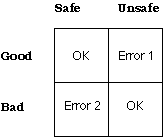
The U.S. Federal Government now has a policy that under certain circumstances commercial airliners may be shot down by the military. Further, the authority for doing this is delegated to the mid-level General Staff of the Air Force. This short note examines this policy, both from the moral and practical standpoints.
The world isn't perfect, as we all know. Usually when you act you do so with imperfect, partial, even misleading information. One therefore must assume that whoever makes the decision to shoot down an airliner or not will do so with less than perfect knowledge of the situation. An airliner that has been hijacked can seem to be normal, just as one that is fine may be acting erratically or out of position, and so seem to have been hijacked. It is even possible for the messages from an airliner to the ground to be spoofed by terrorists with the intent of having an airliner shot out of the sky. Indeed, there have been instances in which the messages from ground control to airliners have been so spoofed.
I'd like to give a demonstration of a certain way to think about such problems. Suppose we call an airliner that has not been hijacked as Good and one that has been hijacked for the purposes of causing destruction as Bad. As mentioned above, it is in principle difficult to impossible to determine whether a given airliner is actually Good or Bad. The likelihood that it is Bad is very small, of course. Certainly in any given situation in which a decision must be made, there is some information to guide the person carrying out the policy.
The decision maker must determine if the airliner is Safe or Unsafe. That is to say we call an airliner Safe if we judge it to be good and unsafe otherwise. This leaves us with four possibilities. If we always judge Good airliners Safe and Bad ones Unsafe, then all is well. However, there are two ways in which we can make an error.
The first type of error is when we judge a Good airliner as Unsafe. In this case the policy maker will order that the airliner be shot down, when in fact it should not have been. This is terrible.
The second type of error is when we judge a Bad airliner as Safe. In this case we leave the terrorists to do their evil. This is terrible.
And here is the dilemma. A shoot down policy doesn't have much influence over the likelihood of Good and Bad, though there is probably some. We do, however, have complete control over the likelihood of Safe and Unsafe judgements. This lies in the details of the policy. A "hair trigger" policy will tend to make errors of type 1, while a very conservative policy will tend to make errors of type 2. But it is inescapable, that if you decrease the likelihood of making one of these errors you increase the possibility of the other. Simply think of sliding the vertical line separating Safe and Unsafe in the figure from left to right and look at the changes in the areas of the two error sections. One will always increase while the other decreases.
Another consideration was passed over above. Does a shoot down policy sufficiently reduce the likelihood of hijackings. In a world in which our opponents are rational, it probably would. But the current situation has shown us that some fanatics are willing to take extreme risks--even certain death--to carry out their evil plans. I think the only sane conclusion is that there will be little deterrent effect in the situations that the policy is designed to cover. In fact, because of this willingness to die for their beliefs, the situation is much worse that I've detailed above. It may be that the goals of fanatics would be met whether their original plans succeed or they are shot down by the military. Imagine the feeling we would have if several airliners were shot down on the same day.
No one has seemed to question the necessity and desirability of this new policy. Its morality is troubling, however. There seems to be an equation that a few tens or hundreds of innocent people dying in an airliner is preferable to a few thousands dying on the ground. But it goes beyond that. In order to carry out the policy, someone has to decide to actually shoot those few tens of people out of the air. So you are directly causing the deaths of one set of people to save the lives of others. I ignore financial considerations here as the equation comparing a few millions of dollars in the aircraft with a few billions of dollars in the buildings destroyed is too crass to consider compared with the lives at stake.
So the question is, can you morally kill one innocent person, or a few, to save the lives of others, even many? These innocents cannot be considered collateral damage with a statement that we didn't intend their deaths, even though we directly caused them. I think that the basis of the arguments of religious conservatives against abortion are precisely the same as this. Can you kill one person to save another. Most moralists, conservative or not, would reject this position.
Some would say that by committing one evil you are preventing a greater evil. This is a false choice. For the moral person, the dilemma is clear. I can choose to permit one evil to prevent a greater one, but I cannot cause one evil to prevent a greater one--especially when the one I am to commit is extremely grave on its face.
Thus it seems that both on moral and practical grounds, such a shoot down policy is untenable.